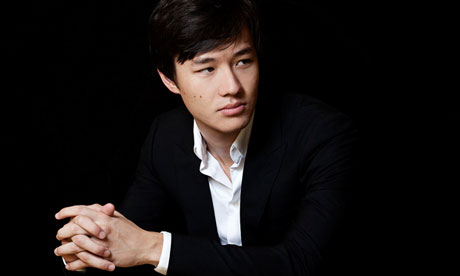
The young Swiss-Chinese pianist Louis Schwizgebel won second prize in last year's Leeds piano competition and, while already embarked on the career the prize more or less guarantees, is still studying at the Juilliard school in New York. But in his lunchtime recital at the Machynlleth festival, nothing was so emblematic of the isolation, if not loneliness, of the solo artist than his performance of Liszt's Vallée d'Obermann.
While the Swiss valley is purely imaginary, inspired by Étienne Pivert de Senancour's epistolary novel, its exploration of the depths of despair makes for one of Liszt's virtuoso showpieces. Schwizgebel handled it with poise and power. Liszt's vast sonorities were followed by Elis, the Three Nightpieces for piano by Schwizgebel's compatriot Heinz Holliger, showing exactly the concern for attack and poetically expressive detail that motivated the composer. Flanking the Liszt and Holliger were Mozart's Sonata in D major K 311 and Ravel's Gaspard de la Nuit, each beautifully articulated, with Ravel's affinity for Mozart always implicit. Schwizgebel's programme was subtly constructed, not least in its sequence of dramatic recitatives, operatic in projection, wholly pianistic in sound – a further indication of a pianist with a profound gift.
In their evening recital, violinist Alina Ibragimova and pianist Cédric Tiberghien played Beethoven's three sonatas in A major, written over a span of some six years and each as different as possible from the other. Culminating in the great Kreutzer Sonata, Op 47, it was a bold survey of the emerging romantic by this unassuming but incredibly dynamic partnership. Ibragimova's purity of line combined with her brilliant flashes of insight was simply awesome, and the slow movement of the Spring Sonata as encore underlined these sensibilities. Julius Drake's artistic direction has made Machynlleth even better.
• What have you been to see lately? Tell us about it on Twitter using
#Iwasthere

